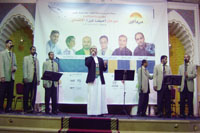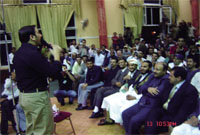
The new age of “nasheed,” or Islamic songs [Archives:2008/1180/Culture]
August 11 2008
 |
 |
For the Yemen Times
In the past, nasheed, or Islamic song, was restricted to spirituals performed on some occasions such as childbirth, deaths, mystic groups' meetings called “zaweyah” and other religious celebrations. Nasheed themes focused on eulogies, jihad and revolutionary songs. But during the past 10 years, nasheed began addressing public life and the societal issues as well. The famous Islamic singer Sami Yousif is considered the first to begin the new trend of nasheed and Islamic video clips, which represent a major departure from the nasheed known throughout history.
Following that, other singers followed Yousif in addressing different societal issues such as the plight of Palestinians, family disputes and romantic relationships. These other singers like Abdul Fattah Awainat, Yahya Hawwa and Ashraf Yousif produced songs on cassettes and in books. Nasheed became an organized artistic movement, with Islamic singers spreading their songs through internet forums and websites.
The nasheed artistic movement was led by talented singers whom people admired, and gained popularity because the songs addressed their real-life concerns. Islamic songs opened a new venue for youth to express themselves through music that followed religious guidelines.
Abdul Fattah Awainat, an Islamic singer, said that he tries to offer what youth want in his songs and not what he himself likes. “We select the songs that appeal to the young,” said Awainat. “If we try to impose our songs on them, they will not accept it and our songs will receive no attention.” He pointed out that Islamic singers focus on songs through which they can deliver a message that emphasizes the importance of collaboration and optimism among people. Awainat said that if nasheed follows the old patterns, which some people consider slow and gloomy, the message will not reach the intended target.
Awainat said that Islamic songs are performed similarly to non-religious songs in terms of a quick rhythm and using informal, everyday language. He added that the use of video clips is the key to attracting youth and school-aged fans. “Students are no longer confined to their school curriculum to get culture, since audio-visual means appeal to youth more than reading,” said Awainat. “Therefore, we try to call them to the good behavior through nasheed.”
Yahya Hawwa, another Islamic singer, views that nasheed, as well as the Holy Qur'an, and mosque sermons, is a way of delivering Islamic teachings to society.
“I use my voice to call people to Allah through reciting the Holy Qur'an and preaching in the mosque,” he said, adding, “and I also use my voice to call people to Allah and pay their attention to their behavior through nasheed.”
Hawwa said that nasheed urges young people to change their life for the better by instilling in them political inclinations. “Nasheed also focuses on the songs that urge people to hold out on the enemy during fighting,” he said.
Hawwa said that he holds sessions with his peers to discuss the concerns of young people and come up with issues they should highlight in their songs. Hawwa is interested in making songs that offer hope and optimism. “I realized that this side is marginalized, since many Islamic songs are overwhelmed by sadness and lamentation,” he said. “Because young people are full of hope and vitality, we have to make songs that go along with their dreams and aspirations.” Hawwa said that in the past, nasheed was totally dependent on the singer's voice without background music due to some scholars' ban on the use of instruments in Islamic song.
Though the old style of nasheed – the one that focuses on sadness and scolding – is still around, the newer style is now dominating the market because of the way these singers focus on youth and reach their audience through the use technology, according to Hawwa.
He maintained that the young should be encouraged to live their life for the sake of Allah in the way that doesn't deprive them of the permissible things in life according to the Islamic regulations. “A lot of religious scholars concentrate on issues of death for the sake of Allah and neglect life for the sake of Allah,” Hawwa added.
Nasheed hasn't yet reached the stage where it is competing with the other kinds of songs on the television and radio, but it succeeds in addressing society's issues through youth-centered satellite channels, according to Musa Mustafa, a Syrian nasheed performer. In his songs, Mustafa discusses issues of love between couples or those who are still engaged, relationships between family members, and issues of expatriates who live outside of their countries. Some of these songs, particularly the love songs, created controversy among religious men who consider such topics to be forbidden.
However, Mustafa stressed that nasheed should deal with all kinds of concerns, including love, as they are inherent in human nature. “We should include love issues in nasheed since the young are interested in such songs,” said Mustafa. “A girl told me that her fiance refused to listen to nasheed because he thought it only dealt with revolution and jihad and didn't address love,” he added. Mustafa said that he thinks his version of nasheed presents love in its clear and real image in order to protect people from indulging themselves in the illicit love and relationships.
Mustafa emphasized the importance of educating young people and opening them up to the world in a positive way, particularly given that people nowadays have unlimited access to information through the internet as well as universities. “Religion is not confined to performing prayer and other kinds of worship,” said Mustafa. “There are other issues that youth should learn in Islam, and religious scholars should display a clear image of Islam,” he said.
People must understand religion properly in order to distinguish between good and bad and to stay away from extremism, according to Mustafa. He said that nasheed performers have a purpose, which is to discuss all the aspects of life according to the Islamic regulations, and listeners can in turn disseminate that message to others.
——
[archive-e:1180-v:16-y:2008-d:2008-08-11-p:culture]


